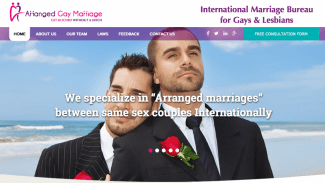When it comes to marriage, how are you supposed to find THE ONE? It's hard enough finding someone to go out on a date, but to find THE ONE must be nearly impossible, no?
Thanks to modern technology, we can now supposedly find a date / hook up faster than we can order a pizza. With the success of multiple "dating" sites, when an "Arranged Marriage" website popped up, we weren't surprised. But what may be shocking is who the website may be aimed at and who is signing up on www.arrangedgaymarriage.com
It’s a custom for which India is well known: arranged marriages, when parents pick appropriate spouses for their children based on caste, class, education and looks. By some counts, as many as three in four Indians still prefer to find a partner this way. “Matrimonial” ads — personal ads seeking brides and grooms — have been common in Indian newspapers for decades, and in the Internet age apps and websites have proliferated around the demand.
Now, an Indian-American is bringing these convenient matchmaking tools to gay men and women around the world — even if India won’t recognize their marriages yet.
“The big step for us was when the United States made gay marriage legal,” said Joshua Samson, the CEO of Arranged Gay Marriage. “We knew there is a huge underground gay and lesbian community in India, and we thought why not spread some light out there, help people who feel like they can never be helped?”
Samson originally meant for the service, which is registered in the US, to help gay Indian-Americans find Indian spouses. India still upholds a colonial-era law that criminalizes all sexual intercourse “against the order of nature,” and gay sex therefore remains a crime. However, same-sex unions aren’t explicitly outlawed.
“Same-sex marriage may be occurring in the country but unfortunately these couples are still fearful to go public with anything. So we are not aware of any statistics,” Samson says.
…
There’s been a variety of demand since the company was founded in November last year: There are Indians seeking Indians, Indian-Americans seeking others in the Indian diaspora, and people from countries like Mexico and Canada signing up as well. So far, Samson has received around 300 requests, but only around 25 have been chosen as clients. He claims the selectiveness weeds out those who do not seem serious about getting married, who are simply looking for green cards or expecting mail-order brides and grooms.
Harish Iyer, an equal-rights activist in Mumbai, is certain that looking for a same-sex spouse cannot be considered against the law, as the union does not directly imply soliciting “unnatural” sex. Additionally, there are no clear laws criminalizing gay marriage in the country. He would know, as Iyer made the news in India last year when his mother placed a matrimonial ad in the papers looking for a husband for her son.
“My mother was concerned about my loneliness, she didn’t want to make a political statement,” said Iyer. “She was more concerned about the fact that I’m growing old, that I would be single, which is [a] very natural [concern] in the Indian context.”
However, the ad drew criticism from supporters of equal marriage rights, as well. One of the key reasons many Indian parents continue to discourage “love” marriages is that they want to ensure their child marries within the caste — and definitely not below it. Clear caste preferences expressed in matrimonials have been criticized for reinforcing caste segregation. Though Iyer’s ad had the progressive “caste no bar” tag, it also mentioned that partners of the same caste would be preferred.
“[The ad] was in no way casteist, tomorrow I can marry a Muslim man as long as he is vegetarian. Everyone has preferences,” said Iyer. He says the language in his mother’s ad “was a joke on those casteist ads, it was to say that gay people have the same kind of preferences and [flaws]” that straight people do.
Gay men and women in urban India can often live without persecution if their families are supportive, but may still face a lack of acknowledgement from friends and family. Talking about gay relationships using traditional Indian terms and practices may actually help with that.
“Our lifestyles are so illegitimate that … it’s just very lonely,” said an Indian woman studying in New York City who asked not to be named. “The idea of an arranged marriage can seem a bit archaic, but as an avenue to find someone to be with, I think it is great.” … – pri.org
For the full article by Nimisha Jaiswal (follow) , head over to pri.org.
I would think that Indians would want to put the practice of arranged marriages behind them, especially LGBTers. Is the tradition so strong? Or is the loneliness too unbearable?
Would you sign up on an arranged marriages website?
Is this so different than match.com or plenty of fish?
We will have to wait and see the success rate of www.arrangedgaymarriage.com
H/T Nimisha Jaiswal (follow) and pri.org.




